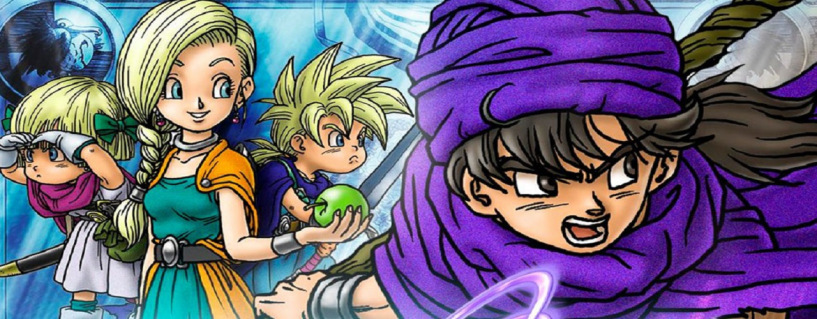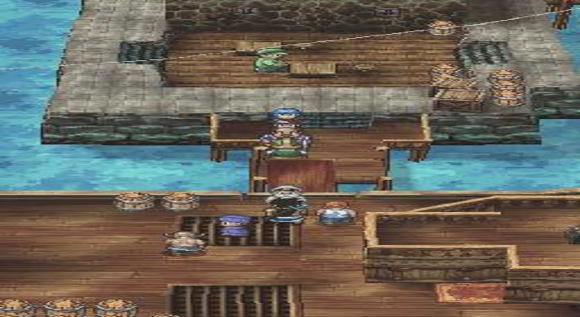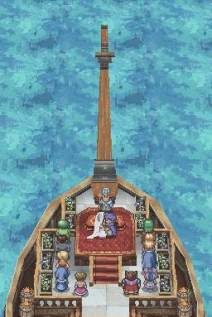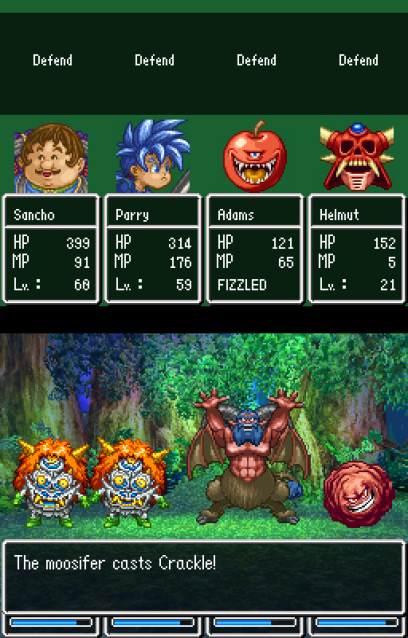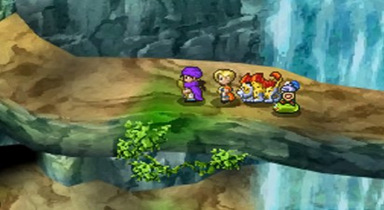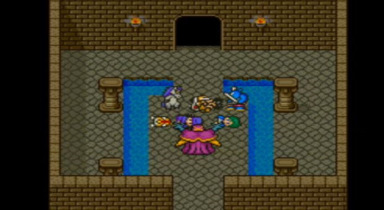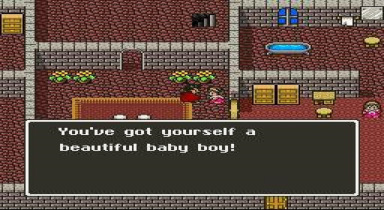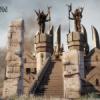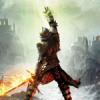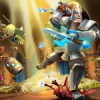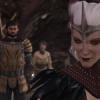The 1990s was a golden age for JRPGs. It was in this decade that many of most beloved role-playing games were created, and many tropes were born or solidified.
The Dragon Quest series is not one that prides itself on innovation. Yuji Horii has designed every main game since the series’ debut in 1986, and from a gameplay perspective Dragon Quest has not strayed too far from that original template. While I would never call any of the Dragon Quest games bad, it wouldn’t be difficult to make the case that the series is, in some ways, stagnant. However, despite its archaic gameplay I’d argue that the fifth iteration in the series - released in 1992 and remade for the PlayStation 2 in 2004, then the DS in 2008 - is not only the best, but one of the finest videogame experiences in the entire genre. While it undeniably subscribes to many of the same themes that JRPGs to this day still cling to, its astounding narrative goes off the beaten path in many ways, and the way in which it is all presented is nearly flawless.
Growing up, I never had the patience for role playing games; I preferred the fast-paced action of Contra and Super Smash Bros. Melee to 60-hour quests full of turn-based combat and pages and pages (and pages) of dialogue. I’ve always been a big fan of retro games, but never really gave role-playing games the chance they deserved - at least until I read the second issue of Ray Barnholt’s Scroll magazine, a publication that is essentially a love letter to games of the past.
This particular issue focused on the Dragon Quest series, and after reading it I felt that any series that one of my favorite games journalists put so much blood, sweat, and tears into was worth a shot. Itching to kill some Slimes and explore some grottos, I went out and bought the DS remake of Dragon Quest IV and the then-new Dragon Quest IX. These games, with their charming characters and endless supply of puns, captured my attention in a serious way. Hungry for more, I went out and bought Dragon Quest V: Hand of the Heavenly Bride, and nothing could have prepared me for the journey it would take me on and ultimately the love of RPGs it would grant me.
The game opens on a scene of your protagonist being born. Fast forward a few years, and you find yourself on a boat with your father who is journeying to meet up with an old pal. On the ship, you meet a girl the same age as you named Bianca, and once it docks, the two of you explore a town tormented by ghosts and make your way through their lair so that the citizens (and sabercat cubs) may rest easy. One thing leads to another, and your father is murdered and the monsters that brutally ended his life sell you into slavery. Needless to say, Dragon Quest V begins with tragedy.
Throughout the rest of the game, you get to watch the hero grow into himself. From the days of barely being unable to walk to adult, you’re in complete control of him. Along the way, you marry a woman (one of the three options in the DS remake) and have children, all of whom become critical parts of your party. Many RPGs at the time, and even today, features parties that consist of individuals who meet through happenstance and end up saving the world. In Dragon Quest V, you share the greatest bond of all with your party-they’re family.
Saving the entire world as “the chosen one” is perhaps the most tried and true trope of all role-playing games. However, unlike your average Final Fantasy or your Shin Megami Tensei’s, you’re saving the world for perhaps the most personal reason of all: family. Throughout the course of Dragon Quest V, you will avenge your father’s death, rescue your wife from stone imprisonment (among other things), unravel the mystery of your mother’s disappearance, and protect your two beautiful children. While the loveable Sancho and Prince Harry aren’t quite family and definitely aren’t worth forgetting, the majority of the major plot points in the game focus on familial ties.
This intimacy makes it incredibly difficult to pick just one moment which encapsulates just how wonderful Dragon Quest V is. Your father’s valiant sacrifice to protect his son’s life sets the tone for the rest of the game, but the joyousness of the birth of your children is tremendous. Rescuing your wife, cursed into a stone body, from a temple you built while enslaved by your father’s murderers is certainly nothing to scoff at either. Instead of choosing just one, I would like to draw attention to the theme of family that ties them together. It gives the story a certain oomph (see what I did there, Dragon Quest fans?) that it wouldn’t have otherwise, making many of the game’s pivotal moments particularly poignant.
And from a gameplay perspective, what Yuuji Horii accomplished that few other game designers have done in the past is that every step of the way feels like it matters. On paper, the storyline is undeniably compelling, but that only makes for good literature; it’s how that story is presented for the player to interact with which is critical. The storyline is constantly moving, and you’re right there with it every step of the way-there’s no disconnect. Like a Haruki Murakami novel, Dragon Quest V has a distinct lack of filler material. Just about everything that happens holds some amount of significance, even if it’s not immediately apparent. Sure, there are sidequests here and there, a casino to spend hours losing your gold at, and more random encounters than I’m sure anyone would like, but throughout its the game’s run, I never lost the sense that I was making serious progress with the hero’s life, whether I was piecing together his backstory (just as he was) or naming his children he had with the wife I selected.
And this intimate focus on family coupled with a stark lack of filler material isn’t the only way in which Dragon Quest V’s story innovated in 1992. At the time, many RPGs had you playing as some sort of “chosen one” predetermined to save the world along with a group of folks encountered along the way from supreme evil. Even today, this is a plot device that persists-after all, it’s convenient and requires little explanation. While Dragon Quest V doesn’t drop the concept of the “chosen one”, it does deviate in that the main hero is not destined to be the world’s savior-his son is.
For people that have grown up on more modern forays into the genre, it’s entirely possible that Dragon Quest V’sevident age will be a huge hurdle for enjoyment. There’s a neat monster taming system that allows for some serious party customization, but beyond that, the combat is little different from the first Dragon Quest. At the end of the day, you’re still going from town to town and dungeon to dungeon solving conflicts and fighting bosses until the game ends, But, I would argue that a good narrative is timeless, and the presentation of the events that occur throughout Dragon Quest V’s 25 hour run is so well done that it still deserves world’s attention 22 years after its original release. Horii’s masterpieceopened up my eyes to roleplaying games and all that they can be. Since playing it, I have gone back and experienced many of the seminal greats-Chrono Trigger, Final Fantasy VI, Earthbound-and while their stories are undoubtedly, no game has been able to captivate me like Dragon Quest V, and I challenge anyone to play through it and tell me they weren’t moved. Seriously.

